Khartoum (1966)
Directed by: Basil Dearden
Written by: Robert Ardrey
Starring: Charlton Heston, Laurence Olivier, Ralph Richardson, Richard Johnson
USA
AVAILABLE ON DUAL FORMAT: 3rd December, from EUREKA ENTERTAINMENT
RUNNING TIME: 136 mins
REVIEWED BY: Dr Lenera, Official HCF Critic
1883, the Sudan: a force of poorly trained Egyptians is slaughtered by Muslim zealots led by Muhammad Ahmad, who believes he is the Mahdi, the prophesied “saviour of humanity”. British PM William Ewart Gladstone sends military hero Major General Charles George Gordon there to evacuate troops and civilians at the advice of foreign secretary Granville Leveson-Gower, who knows that Gordon tends not to do as he’s told and that the British government can absolve themselves of any responsibility over the area if Gordon ignores his orders. Once in Khartoum, Gordon begins organising the defences and rallying the people….
I hadn’t seen Khartoum for about 40 years, the last being when I was very young [yes, I know that dates me], until watching Eureka’s Blu-ray of the film. I remembered lots of battle scenes and two bits which shocked me at the time – Gordon being shown by the Madhi the severed heads and even holding the severed hand of people Gordon knew who he’d recently had killed – and the ending. Certain things can make a strong impression on a young child. Finally viewing it again revealed it to be a decent stab at an intelligent historical drama, a sort of cross between The Four Feathers and Lawrence Of Arabia if you want me to sum up what I think it’s like by referring to other films. Though I’m not quite as well up on this stuff as I used to be [I devoured it as a kid], it seems to me to be a fairly true to life account of a fairly well documented part of British colonial history, though it appears to make its enigmatic central character seem rather more heroic and likable than he may have been, and doesn’t really attempt to explore this fascinating personality experts are in debate over, something not really helped by Charlton Heston’s stoic performance which is basically the same one he gave when playing most of the other historical giants he impersonated in movies. There’s no doubt that he had a powerful presence and exuded heroism, but I don’t feel that he was that good an actor and this film proves it. And some of the action, of which there’s quite a lot, is rather disjointed and feels shoehorned in. Still, for most of the time it looks pretty authentic except for all the white actors in blackface.
Robert Ardrey wrote the script for this at the encouragement of producer Julius Blaustein. He sent a copy of the script to the real-life Mahdi’s grandson, who responded that although his grandfather and Gordon never actually met, “it’s a very fine script.” When Blaustein apologised for this error, the grandson replied, “Ah, but Mr. Blaustein, they should have!” The two however did correspond at length. Paramount were going to make the film in 1963 with Burt Lancaster as Gordon and Lewis Gilbert directing, but couldn’t find the money. Then the project went around several studios before United Artists picked up what many considered to be an un-commercial enterprise, and Charlton Heston took over the lead role. He wanted Carol Reed to direct it, and wasn’t happy with Basil Dearden’s work. Filming took place in Egypt, Pinewood Studios and London. Once location filming finished, the shoot went on hiatus to give the very busy Laurence Olivier time to be available for interior scenes in December. He was paid 250 000 dollars for just eight days work. Despite claims to the contrary, over one hundred horses were either severely injured resulting in euthanasia, or died immediately due to unethical stunt methods. The last movie filmed in Ultra Panavision 70 until The Hateful Eight 49 years later, Khartoum did so-so business at the box office, proving right the hesitation by some studios to make it. The cinema version was uncut but UK video and DVD releases were cut by 29 secs by the BBFC to edit footage of dangerous horse falls. This Eureka Blu-ray unfortunately seems to contain these often jarring edits, but that’s the fault of the ridiculous BBFC, not Eureka.
This Blu-ray version restores the prologue, intermission and exit portions which would have been seen in the ‘road show’ version in 1966 before it went into general release, consisting of expanded portions of the film’s score by Frank Cordell. The opening prologue piece sets out the two main Arabic-tinged themes and a very Edward Elgar-like one for Gordon, which is in a way appropriate as Elgar almost wrote a sympathy on the man, though you may tire of the way it plays so often when Gordon’s on screen. Scene-setting narration is then rather over elaborate, but what joy it is after that to see loads of real people pretending to be armies rather than digital creations! They tended to use actual armies to stage these scenes, so you’re probably watching the Egyptian army in a sense going back in time and recreating their past. It’s Egyptians led by British vs. Muslim fanatics, and one can probably write reams about how one can relate things in the film to things that are happening now, but it’s so obvious that I don’t really see the point. Anyway, the Madhi and his lot wins by a combination of being cleverer and being fanatics fighting for what they believe him rather than underpaid soldiers who don’t even want to be there. Switch to England and the likes Ralph Richardson and Michael Hordern playing British statesmen and leaders, most of whom we never see again. We’re given a good example of the manipulation of people who all-but-become scapegoats for failures committed by those in charge. Without really saying it, they’re basically sending somebody to his death and banking on him not doing what he’s told because they know that’s what he’s like. It’s the reputation of the Prime Minister that’s most important.
After an attempt to recruit former slaver Zobeir Pasha – whose son Gordon executed – fails, Gordon sets about trying to hold out for as long as possible, and even amounts a seemingly foolhardy and certainly costly in terms of men but in the end successful night time expedition to get as much grain and other crucial items as much as possible. Despite its sober feel the film’s violent confrontations are quite numerous. I doubt that Basil Dearden had much to do with these scenes, stunt legend Yakima Cannutt being in charge of the second unit, but they’re often awkwardly cut together with possible shots missing. A horseback charge suddenly cuts to frenzied fighting, as if the combatants on the horses suddenly disappeared then materialised 20 or so feet ahead. I have the feeling that much of this is due to the BBFC meddling, though there are some mismatching shots and awkward cutaways which certainly can’t all have been down to censorship. There are quite a lot of bloody deaths we briefly focus on, and the combatants do mostly look like they’re out to kill each other, but at times cost cutting seems to have been an issue, with some other moments only half-realised and rather too many shots of prominent characters on sound stages obviously matted into desert backgrounds. But Dearden’s talent for directing actors and staging intimate scenes pays off on many occasions, especially with regard to the two meetings between Gordon and the Madhi. The encounters between somebody who’s a religious fanatic consumed by delusions of grandeur and someone else full of vanity with an equally strong relationship to God make for great drama even if they didn’t happen, and even Heston rises to the occasion in these scenes. As for Lawrence Olivier, his accent wavers and there would probably be an outcry if a white person played the part today especially with such dark makeup, but Olivier has the presence to still pull it off.
The script makes perfectly clear all the maneuvering both military and political with no feeling of dumbing down. And Gordon gets some very nice scenes with an Egyptian servant whom he seems to feel closer to than anybody else. A gay element appears to be suggested here, though it’s hard to be sure. In other respects they tried to make Gordon, who was something of an eccentric, more palatable for 1966 viewers despite us being shown a few flaws like his willingness to have people executed. In an early scene he says: “I regard myself as a religious man, yet I belong to no church. I’m an able soldier yet I abhor armies. I can even add that I’ve been introduced to hundreds of women but never married. in other words no one’s ever talked me into anything”, but the film then never seems interested in exploring these contradictions, and is very selective about what it tells us about his achievements. He was indeed a national hero who abolished the slave trade in both the Sudan and China, but the fact that he was in China in the first place was because he was fighting in the Second Opium War, a particularly shameful example of British colonialism in which we were battling for control and legalisation [but only so that we could control it] of a drug. Over the question as to whether Gordon really cared about Britain’s subjects or just wanted them kept down, the film leans far more to the first possibility, but it makes no bones about him wanting to become a martyr and isn’t entirely in favour of the idea. Overall Khartoum is more balanced then one might expect. An earlier version would probably have been even more weighed in favour of Gordon and maybe the other British leaders too, while a version today would no doubt make the Mahdi far more sympathetic. If it were made today there would probably be more females in the film in addition to the one belly dancer that we briefly see, but I don’t think it suffers from being virtually all-male, it doesn’t seem to need a female character.
In general Khartoum does seem to give a good impression of what went on, and though it has something of a reputation as being stuffy, I didn’t find that to be the case – though I could maybe have done with being asked to care a bit more. It’s all just a little bit cold and distant, and the lack of attempt to understand its central character leaves something of a hole. There are some very well written moments of Gordon talking to either himself or God, but Heston fails to really let us in during these moments and therefore we aren’t taken any closer to Gordon. Dearden is obviously trying to imitate David Lean but lacks his expertise [and experience] in widescreen framing. Many of the best scenes just consist of two actors talking. Still, if you like your historical movies then there’s certainly enough here to interest and appreciate, and if you’re not too experienced in this genre but have your interest spiked, then check out one [preferably the 1940 version] of the versions of The Four Furthers, as that story works as a sort of sequel, detailing some events that happened soon after the ones that are detailed here.
Eureka’s Blu-ray edition of Khartoum seems to be based on Twilight Time’s Region ‘A’ version. I detected a few minor flickers that weren’t on back projected shots, but in general this is a fine and very sharp looking restoration. The colour scheme is quite muted but that’s no doubt faithful to the original look. According to the audio commentary the film only features a 2.0 sound mix as opposed to the original 4.0 one. To be honest you can’t tell. The sound is properly dynamic when it should be and every element comes through very clearly.
The usual Twilight Time commentary has been ported over. Stalwarts Nick Redman and Julie Kirgo, plus screenwriter Lem Dobbs, provide the expected warm conversing. Sometimes one of them will go off on a tangent on something like the books that Ardrey wrote or the way American’s view Britain for several minutes before somebody else tries to pull him or her back, but you learn a great deal about the historical events, things that were altered, and of course the film. And Redman and Kirgo seem to have a very balanced view of the film, though Dobbs doesn’t appear to find much that’s good in it at all and constantly compares it unfavourably to Lawrence Of Arabia and Zulu. It’s still one of the better Twilight Time talk tracks that I’ve heard. Eureka have added 27 minutes of Sheldon Hall discussing the production and various aspects of the film. He covers most things, as well as having a vastly different opinion of Heston’s performance to me!
In fact Heston cited this as one of the favourites of the films that he did. I don’t think that you’ll agree with him, but you should be both entertained and educated just about enough to make Eureka’s Blu-ray a worthwhile purchase. Just About Recommended.
DETAILS
*1080p presentation (on Blu-ray) from a gorgeous high-definition transfer
*Presented in the film’s correct aspect ratio 2.76:1
*LPCM 2.0 Audio
*Optional English SDH subtitles
*Audio Commentary with Film Historians Lem Dobbs, Julie Kirgo, and Nick Redman
*Exclusive new video interview with film historian Sheldon Hall
*Original theatrical trailer
*PLUS: A collector’s booklet featuring a new essay by Phil Hoad, alongside a selection of rare archival imagery

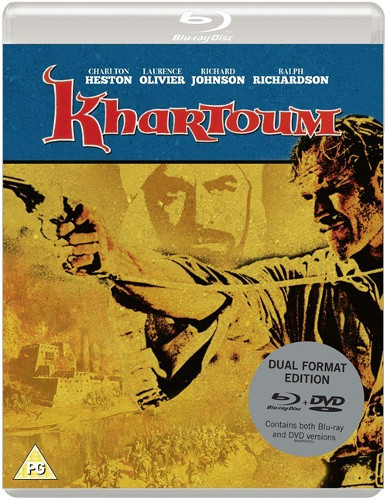
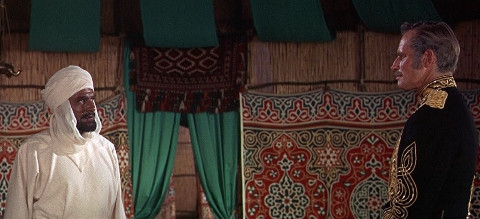
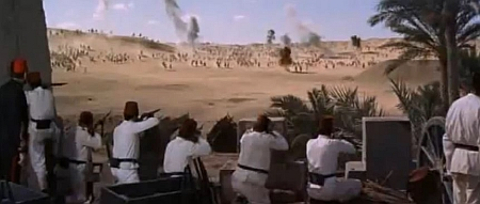




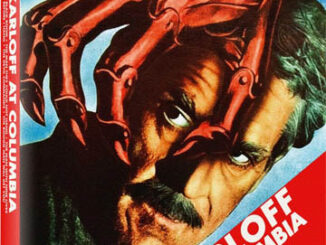
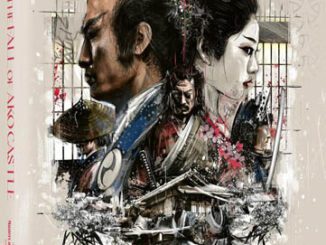
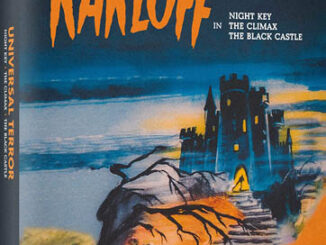
Be the first to comment